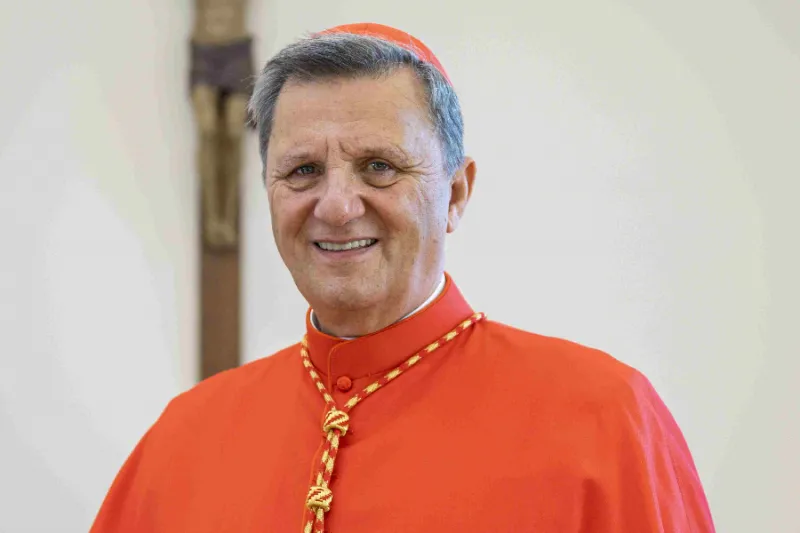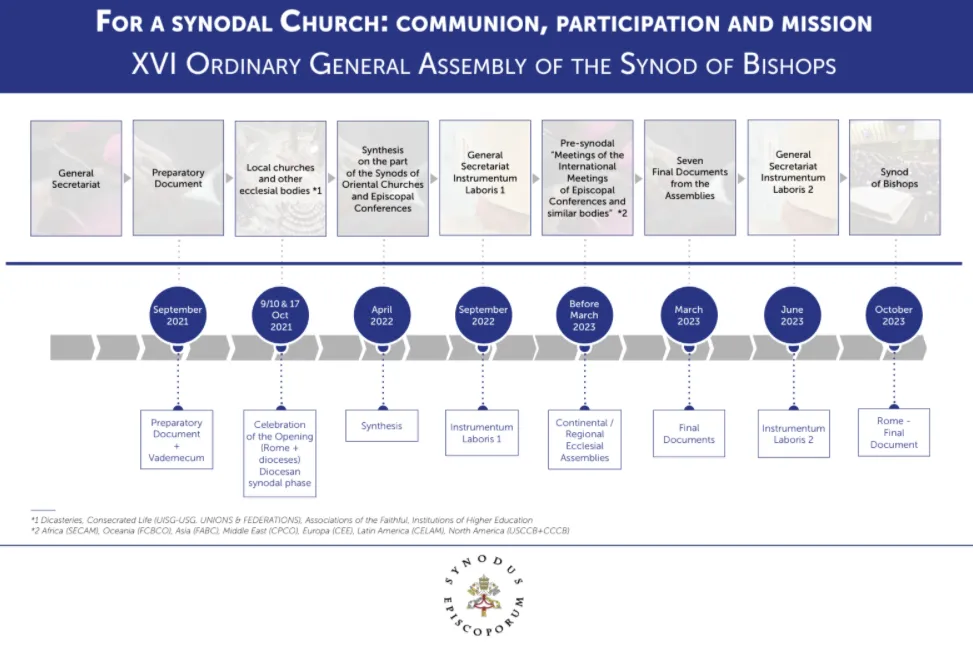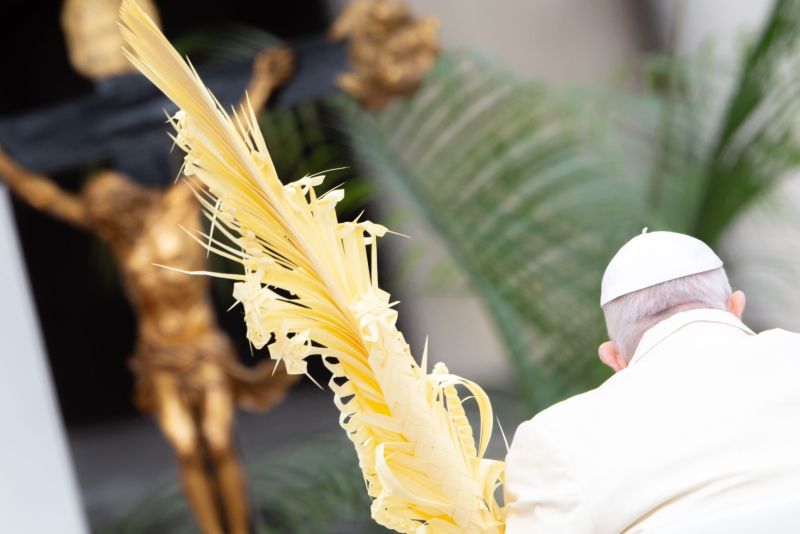
Vatican City, Jul 22, 2021 / 07:00 am (CNA).
Cardinal Mario Grech said on Wednesday that synodality is not a “fad” of the pope, but rather “the form and style of the early Church.”
The Secretary General of Synod of Bishops told Vatican News on July 21 that officials were working on a preparatory document for the 2023 synod on synodality.
“I would like to clarify a misunderstanding. Many people think that synodality is a ‘fad’ of the pope. I hope none of us shares this thought,” he said.
“In the various preparatory meetings, it became clear that synodality was the form and style of the early Church.”
The Vatican announced in May that the 2023 synod would begin with a two-year consultative phase involving Catholic dioceses worldwide.
The General Secretariat of the Synod of Bishops is expected to release a preparatory document and vademecum, or handbook, in September.

The Maltese cardinal, who was appointed to his present role in September 2020, said that the preparatory document recalled the Second Vatican Council’s desire to “return to the sources” of Christianity.
“The preparatory document clearly highlights this; and it highlights how Vatican II, with the movement of ‘return to the sources’ — the Ressourcement — wanted to recover that model of the Church, without renouncing any of the great advances of the Church in the second millennium,” he said.
“If we want to be faithful to Tradition — and the Council should be considered as the most recent stage of Tradition — we must boldly go down this path of the synodal Church.”
A synod is a meeting of bishops gathered to discuss a topic of theological or pastoral significance, to prepare a document of advice or counsel to the pope.
The theme for the upcoming assembly is “For a synodal Church: communion, participation, and mission.”
Earlier this week, the General Secretariat named the members of three groups helping it to prepare for the 2023 gathering.
Grech told Vatican news: “We have created four commissions to support the work leading up to the synod: one for theological study, another to help us grow as a Church in the spirituality of communion, a third for methodology, and finally a fourth that will be dedicated to the aspect of communication.”
Pope Francis is expected to “inaugurate the synodal path” over the weekend of Oct. 9-10 with an opening session and a Mass. All dioceses are invited also to offer an opening Mass on Sunday, Oct. 17.
During the initial “diocesan phase,” each bishop is asked to undertake a consultation with the local Church from October 2021 to April 2022.
The Vatican will then release an instrumentum laboris (working document) in September 2022 for a period of “pre-synodal discernment in continental assemblies,” which will influence a second draft of the working document to be published before June 2023.
The process will culminate with the XVI Ordinary General Assembly of the Synod of Bishops at the Vatican in October 2023.
Asked if the synodal process required too much of local churches, Grech said: “All this is not really a process that complicates the life of the Church. Because without knowing what the Spirit is saying to the Church, we could act in a vacuum and, even without knowing it, against the Spirit.”
“Once we have rediscovered the ‘pneumatological’ dimension of the Church, we can only adopt the dynamism of prophecy-discernment, which lies at the heart of the synodal process. This is especially true when thinking about the third term at play: mission.”
The cardinal recalled that the 2018 youth synod referred to “missionary synodality.”
“Synodality is for mission, it is listening to how the Church becomes itself by living, witnessing and bringing the Gospel. All the terms proposed by the title are connected: they stand or fall together,” he said.
“Let us also ask to be deeply converted to synodality: it means converting to Christ and his Spirit, leaving the primacy to God.”
If you value the news and views Catholic World Report provides, please consider donating to support our efforts. Your contribution will help us continue to make CWR available to all readers worldwide for free, without a subscription. Thank you for your generosity!
Click here for more information on donating to CWR. Click here to sign up for our newsletter.





What they are engaged in has no resemblance to first-millennium synodality.
Card. Grech says: “If we want to be faithful to Tradition…” the Synodal approach is the traditional approach, so it is the way of the future. The TLM is a traditional approach, so it must cease.
Right. Got it.
Now I think I hear Peter crying “Wolf” again. Anyone else hear him??
We read: “Cardinal Mario Grech said on Wednesday that synodality is not a ‘fad’ of the pope, but rather ‘the form and style of the early Church.’”
Very uplifting to hear this, recalling now, for example, the Extraordinary Synod of Bishops convened in 1985, to reclaim after 20 years of distortion the real Council from the virtual Council, and which culminated in publication of the Catechism of the Catholic Church in 1992, as further elucidated in Veritatis Splendor (1993), now long-unmentioned and seemingly a victim of the “throwaway culture.” Both, ALREADY, of “the second millennium’ and advancing aggiornamento and ressourcement!
The fly in the ointment today includes, as but one example, the accommodated German “synodal way”, plus the subliminal message that while synods were “the form and the style of the early Church,” synodality—much abused—is now at risk of becoming the presumptive and very definition of the Church.
Synods and councils are what the Church DOES, not what it IS.
As for the outcome of the Youth Synod which “referred to missionary synodality,” the several gratuitous paragraphs on synodality were tacked on by someone else, not coming out of the Youth Synod at all (!). And it was only with the “demand” of every bishops’ discussion group (I think eighteen in all) that the subversive and enabling code language “LGBTQ,” also not mentioned by the youth (!), was removed from the draft final report, over the earlier objection of the dominating front microphone (Cardinal Baldiserri?).
Now, Cardinal Grech is reassuring, and yet wasn’t it Archbishop Charles Scicluna, also of Malta, who was among those who fell in line with blessing second-marriages without the first being annulled? Another agenda surely awaiting synodal validation…
The doubt is not over the merit or good potential of synods, but that, again, they will be EXPLOITED. And, this doubt, downplayed by Cardinal Grech, has been festered and fostered from on high. It is not simply that synodality is a mere “‘fad’ of the pope”…but that praxis is being severed from dogma, even as the dogma itself is fastidiously and schizophrenically reaffirmed.
Such is my memory. But who am I to judge, or even remember? As for ressourcement, this from St. Ambrose: “Keep safe what you have received.”
The gentleman doth protest too much, methinks.
Cardinal Grech cites synodality in the early Church as today’s model, which it is not. Early Synods 170 AD in the East dealt with Montanism, and later in the West as in the East were synonymous with Council. To date [in deference to the upcoming Synod on synodality] the synodal concept is more a localized body of bishops searching for an ecclesial issue, or doctrine to modify in conformity with current cultural practice. Malta where Grech resides is an example of the reformist proclivity of bishops including well known canonist Archbishop Scicluna who have gone further from what Amoris Laetitia suggests regarding communion and practice, bishops advising the faithful to simply follow their conscience. Example. Cardinal Grech highlights “dynamism of prophecy-discernment” as the guiding principle of synodality, whereas early synods/councils had as their guiding principle pastoral guidance in context of clarification of the revelation of Christ and Apostolic tradition. The former is revisionist the latter were expository.